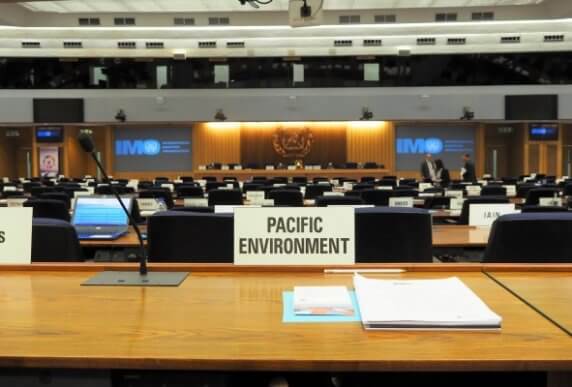“No Delays on Climate Action,” Pacific Environment Tells UN Shipping Chief
Today, Pacific Environment and environmental allies urge the head of the UN’s Shipping Agency to proceed rapidly to decarbonize international shipping. Critical UN environmental meetings have been rightfully postponed due to the COVID-19 pandemic — environmental groups support these actions, but the inability to convene in person must not be used as a pretext to slow progress on the agency’s mandate to reduce the heavy greenhouse gas emissions from ships. In a formal letter to the U.N. Shipping Agency, the environmental groups suggest a number of ways the agency can proceed. The full letter is below.
Dear Secretary General Kitack Lim,
We, the undersigned environmental organizations, respect and fully support the decision to postpone the 75th meeting of the IMO’s Marine Environment Protection Committee (MEPC), given the global imperative to contain and ultimately defeat the COVID-19 pandemic. We are grateful for the leadership of the World Health Organization and other United Nations entities helping respond to the COVID-19 crisis, and we hope you and all IMO colleagues are staying safe and healthy.
We write today to request your personal assurance that IMO’s efforts to achieve its Initial GHG Strategy and phase out of GHG emissions from international shipping consistent with the Paris Agreement temperature goals will not be delayed, despite the postponement of this MEPC. In particular, the IMO Initial Strategy goal of actions to achieve additional substantial CO2 reduction before 2023 should remain unchanged.
As you know, the International Panel on Climate Change (IPCC) has shown that global carbon emissions must halve in the next 10 years to hold temperature rise within a 1.5°C planetary warming threshold. Recently on March 10th United Nations Secretary General Guterres s tated that the world is “currently way off track to meeting either the 1.5°C or 2°C targets that the [IPCC] calls for.” The latest Statement on the State of the Global Climate by the World Meteorological Organization finds that 2019 was the second warmest year on record and that 2010-2019 was the warmest decade on record.
IMO’s Initial GHG strategy has already catalyzed a change of direction within the maritime industry. We are seeing increased interest in developing zero-carbon fuels, and innovations in on-ship infrastructure and technologies. This momentum is encouraging, and we cannot afford to let it diminish.
While MEPC 75 is postponed, we therefore urge the IMO to:
- Launch as soon as possible a digital working group of IMO member states, and entities with IMO consultative status, dedicated to advancing short-term GHG measure negotiations. (For precedent, other multilateral organisations such as the IMF, World Bank, SAARC and OECD are all hosting virtual meetings. Within the UN family, UNEP is exploring whether timesensitive meetings on the Convention on Biological Diversity can be held virtually, while the the UNFCCC Adaptation Committee and Technology Committee are using VOICE (Virtual Online and In-person Conferencing Experience), which supports the formal structures of UN multilateral meetings, such as requesting the floor.
- Choose working arrangements with full sensitivity to the needs of developing countries, SIDS and LDCs in access to communications technology, and provide urgent technical support where necessary.
- Establish a standing technical group to develop virtual convening more deeply. We believe a transparent, well managed, virtual process allowing for presentations and discussion could be useful in allowing IMO’s important work to move forward, until such time as it is appropriate to meet in person again.
- Reschedule MEPC 75 for some time before October, if necessary, in a digital format, and guarantee MEPC 76 is still held within this year, if necessary, in a digital format.
The undersigned environmental organizations stand ready to support the IMO, IMO member states, and the MEPC to continue towards its GHG reduction goals in any way that we can. As NGOs with consultative status we are willing to participate in a proof of concept online process for negotiations, to problem-solve and develop protocols to be endorsed at future meetings.
As you have rightly pointed out numerous times, tackling shipping’s impact on the climate is the biggest challenge facing the sector today. In these uncertain times, we expect the IMO will continue to act on its responsibility to lead the industry in terms of climate ambition and accountability.
Thank you as always for your partnership and we look forward to hearing from you.
Yours sincerely,
John Maggs, Clean Shipping Coalition (on behalf of its members: AirClim, Bellona, Carbon Market Watch, Clean Air Task Force, Environmental Investigation Agency, Nature and Biodiversity Conservation Union, Stichting De Noordzee, Oceana, Ocean Conservancy, Seas at Risk, and Transport & Environment).
Daniel Mittler, Greenpeace International
Madeline Rose, Pacific Environment
Manuel Pulgar-Vidal, WWF International




